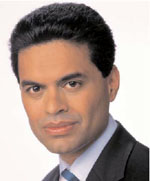Zakaria presents Hart Global Leaders Forum
Fareed Zakaria, editor of Newsweek International, host of “Fareed Zakaria GPS” for CNN Worldwide and author of books including The Post-American World, presented the Hart Global Leaders Forum on Wednesday, September 9.

More than 200 high school students from 61 area schools heard Zakaria speak at Hughes-Trigg Student Forum about the national consequences of success and the advantages of living in a world that is constantly growing. He told the audience that the problems our nation faces are quality problems that are, in fact, a privilege to solve.
Students had the opportunity to ask the journalist questions, and here is what they were thinking:
Where will tomorrow’s leaders come from?
Tomorrow’s leaders will come from all over the world. That is what’s different about the world we are moving into, and we should be comfortable with that, but I think America has a great advantage here. American companies are used to a very diverse workplace with women, with minorities, with people who are black, brown, yellow, green, whatever.
Being able to interact in that kind of world is absolutely crucial to leadership. We still have a long way to go, but we have a head start, and that ability to deal productively with a diverse group of people and a diverse group of leaders is a very powerful American trait.
You have said that a good thing about the economic crisis is that Americans are beginning to save. Do you still see that trend, and what does it mean for our consumer-based economy?
I think the American consumer can save more and should save more. Unfortunately, right now the government is providing all the wrong incentives. They’re telling people to go out and buy houses they can’t afford, and go out and get credit you can’t afford.
Look, we will always be a consumer-based economy. So, where will the Dow come from? It has to come from productivity, from invention, from manufacturing, from making stuff – not buying stuff. We are a country that has done extraordinarily well in this new world of globalization. By and large, it is possible to construct an economy that is not based on simply going to the mall.
To what extent do you think the United States has an obligation to maintain its role as the “global police”?
That is a great question. We have a world of rising global powers. What does this mean for our role in the world? Somebody has to be out there to make sure Somali pirates aren’t destructive. Historically, it has been very difficult to get a group of countries to provide that kind of leadership. Can we engage these other countries to get them to be not just consumers of peace, but producers of peace? If we can do that, that will be the most stable world because all these countries then have a stake in the system.
We don’t want to be the lone superpower for everyone. We shouldn’t want to do that. The danger for us is that we overinterpret our mandate and involve ourselves in every peripheral part of the world because nobody else will.
Due to inefficient conservation, pollution and climate change, it seems as if the world, specifically Asia, is on a path to a water shortage. How do you suggest we rectify it?
In a world of rising powers and in a world of limited natural resources, it would make sense to imagine that one of the great tensions would be competition over these resources, whether they are water, oil, copper or minerals.
My long-term answer is desalination, by which I mean, technology.
How can we have 2 billion more people arrive in this world and raise their living standards and not destroy the planet? My gut is that human beings have an extraordinary capacity for invention, and when we are confronted with these kinds of crisis, we will invent our way out of the problem.
– Mallory McCall ’10
# # #